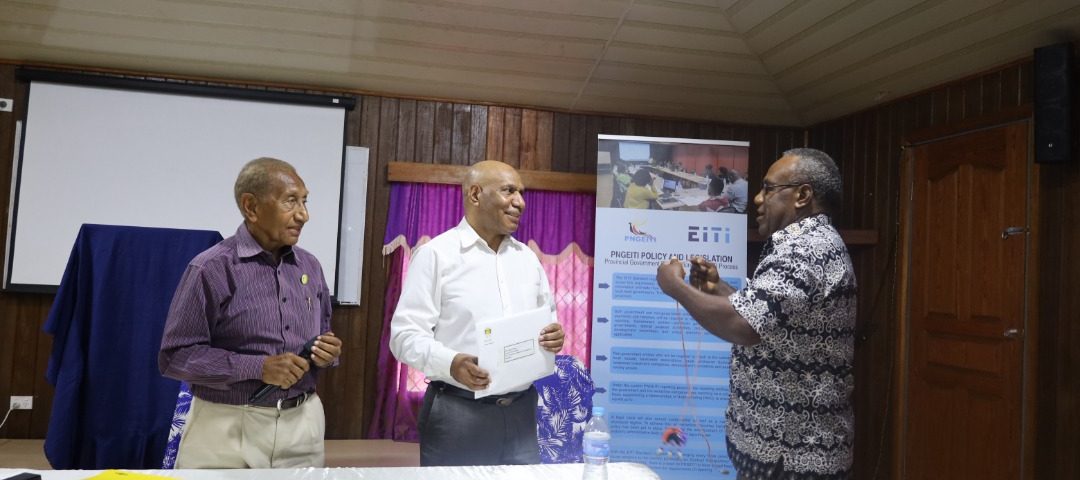improving extractives governance
Projects and Development News
The EITI holds all implementing countries to the same global standard. Through Validation, the EITI’s quality assurance mechanism, implementing countries are assessed on their ability to meet the provisions of the EITI Standard.

Proposed Extractive Industries Transparency Commission Law will keep all in-check
PROPOSED EXTRACTIVE INDUSTRIES TRANSPARENCY COMMISSION LAW WILL KEEP ALL IN-CHECK: SIR JULIUS CHAN KAVIENG, 13 JULY, 2021: New Ireland Governor Sir Julius Chain says a proposed law to promote transparency and accountability in the mining and petroleum space will keep everyone honest in the long run. Sir Julius Chan made this remark when he opened the Extractive industries Transparency Commission Bill consultation for the New Guinea Island Region in Kavieng yesterday. The Extractive Industries Transparency Commission Bill aims to establish the PNGEITI National Secretariat as a statutory body charged with the responsibility of promoting transparency and accountability in the mining and petroleum space. The former Prime Minister, who is vocal on extractive industries benefits for local people said now is the time for all stakeholders to act in the best interest of deriving best value from PNG’s rich natural resource endowment is now. A State Technical working group comprising the Department of Petroleum, State Solicitor, Internal Revenue Commission, Department of Personnel Management, Department of Treasury are in the New Ireland capital, Kavieng for a four days consultation for the New Guinea Islands region. “Your coming to New Ireland is an honour for us to air our little experiences. The Extractive Industries Transparency Commission will go a long way to keep everyone honest. This is a world to share – if we do it right, there will be enough to go around. Now it is my honour to declare this gathering of important people charting the future of our Extractive Industries Transparency Commission Consultation Forum Open,” Sir Julius Chan said. Head of the PNGEITI National Secretariat Mr. Lucas Alkan thanked the Sir J for opening the workshop which is the first of regional consultations rolled out in the three other regions this year. “On behalf of the State Working Group on this piece of legislation, I thank Sir Julius Chan, one of our prominent statesmen for the support and for the welcome that we’ve received in his home, New Ireland province where the consultation covering the New Guinea Islands Region is being held this week. “The PNGEITI is a state initiative and it’s only fitting and a delightful moment for the state working group on the proposed legislation and the instrumentalities involved in the process to have one of our founding statemen to show his support for this cause. “PNGEIT has been in operations since 2014, established effected by a NEC Decision and now we are moving into the next step in anchoring this extractive industry implementation and reporting process into PNG’s legal and administrative system. PNGEITI published 7 annual EITI reports detailing activities taking place in the PNG mining and petroleum space. “We thank the New Ireland Governor with its hardworking administration team for the support and the welcome that we have received from New Ireland. We look forward to a meaningful consultation in the coming days with all stakeholders from Government, Civil Societies and representatives from the resource companies host,’’ Mr. Alkan said. Image Caption: New Ireland Governor Sir Julius Chan, officially opens the NGI regional consultation, Head of the PNGEITI National Secretariat Lucas Alkan (middle) and New Ireland Provincial Administrator.

Extractive Industries Transparency Commission Bill ready for regional consultation
A proposed legislation to transition the Papua New Guinea Extractive Industries Transparency Initiative National Secretariat into a statutory body is ready for public consultation beginning next month. This follows the successful conclusion of a series of consultation among legal and technical officials of key government institutions, mining and petroleum companies and civil society organisations on the elements of what is proposed to be the Papua New Guinea Extractive Industries Transparency Commission. PNGEITI Head of National Secretariat Mr. Lucas Alkan thanked instrumentalities involved in the progress made so far in shaping an appropriate legislation that will be a best fit for the replacement of the PNGEITI National Secretariat which is currently placed under Department of Treasury. “When enacted into law, the PNGEIT Commission will function as a statutory body for the implementation of the global Extractive Industries Transparency Initiative Standard and principles through the publication of EITI Reports,” Mr. Alkan said. “The push for the establishment of the PNGEIT Commission is part of a bigger policy drive to institutionalise and systemise EITI reporting anchored into the PNG legal and policy framework. “PNG has made considerable progress with the publication of seven flagship PNGEITI Reports since PNG subscribed to the EITI Global Standards in 2014 to promote transparency and accountability in mining and petroleum sectors to enhance good governance and better management of proceeds from these important sectors of the economy. “Seven years into implementing the EITI Standards through the publication of EITI Country reports and considering the fact that PNG is endowed richly with mineral and petroleum resources, PNGEITI is maturing into its next stage to meet the evolving challenges of the industry. “What the PNGEITI Multi Stakeholder Group is doing is to legally establish an entity to render administrative services for effective EITI implementation in Papua New Guinea. “I am pleased to note that considerable progress has been made so far with a draft bill in our hands and also pleased to note that the PNGEITI is comfortable with this piece of legislation which will undergo further public consultation in the coming months. “A technical team conducting consultation on the draft bill will commence next month and I encourage all stakeholders to participate in the consultation so that we get a final product that has the inputs of the wider public. “First consultation will be held in the New Ireland Province for the New Guinea Islands region and then proceed to the rest of the regions in the country,” Mr. Alkan said. Caption: PNGEIT Commission Bill Technical Working Group Team Members from left; Eva Boas (Department of Personnel Management), Vanessa Asivo (Internal Revenue Commission) Channan Kumalau (Department of Petroleum) and Lois Stanley (Constitutional Law Reform Commission) at a consultation for the proposed bill mid-June in Port Moresby.

Scoping Study to be conducted on Extractive state-owned entities
The PNGEITI National Secretariat through its Multi-stakeholders Group (MSG) has already commenced preparation to engage a consultant to scope out the operations of State-Owned Entities (SOEs) including Trustees involved in the extractive sector or those that have an equity share (either on behalf of the Government or provincial governments). Head of National Secretariat Lucas Alkan announced this week that the execution of the study on SOEs was an important undertaking in not only meeting the requirement of the EITI Standard as recommended in the country’s first validation but also, as part of the Government’s commitment to enhancing transparency in the operations of these entities. “The scoping study will also include Trustees established by the Government for managing businesses arms established by provincial, local level governments and landowners using revenue flows from extractive activities in the country,” Alkan said. “The study is intended to understand the relations between all SOEs and trustees and the transactions between extractive SOEs (and their subsidiaries) and to recommend possible policy and legislative reforms to improve transparency and accountability for EITI reporting requirements. “Most importantly, to enable the Government to have a clear visibility and oversight on the operations of these entities,” Alkan said. He said though the study will be confined to SOEs involved in the extractive sector only, the work will complement and support the Government’s overall SOE reform policy agenda being progressed. A Technical Working Group made up of MSG members has been working to engage a consultant to execute the study. An announcement for expressions of interest for a consultant was advertised in the daily newspapers last week and also posted on the PNGEITI website. The following recommendations were made for the study of SOEs; PNG should clearly establish its definition of SOEs to delineate the SOEs within the scope of EITI reporting to ensure that a comprehensive list of state participation in the extractive industries, including terms associated with state equity and any changes in the year under review be publicly accessible. PNG must clarify the rules and practices governing financial relations between all SOEs, including their subsidiaries, and the State, including the existence of any loans or guarantees extended by the State, or SOEs, to extractive companies or projects. PNG should undertake a comprehensive assessment of transactions between extractives SOEs (and their subsidiaries) and mining, oil and gas companies, as well as between the extractive SOEs (including their subsidiaries) and government in its scoping for future EITI Reports. All SOEs collecting material revenues or making material payments to government should be included in future EITI reporting. PNG should undertake a comprehensive review of all expenditures undertaken by extractive SOEs (and their subsidiaries) that could be considered quasi-fiscal. Furthermore, it was recommended through the validation process that PNG should develop a reporting process with a view to achieving a level of transparency commensurate with other payments and revenue streams, and should include SOE subsidiaries and joint ventures and their financing and equity arrangements in extractive projects. The study is anticipated to take about 4 to 5 months and will commence in April, 2020. The MSG anticipates to implement the findings from this study in early 2021. Background information on PNG’s implementation of the EITI Standard The EITI implementation in PNG was validated against the EITI Standard by an independent validator in early 2018. Subsequently, the EITI Board granted PNG ‘Meaningful Progress’ overall in implementing the EITI Standard following the conclusion of the first country validation. This means that PNG met some of the key requirements of implementing the EITI Standard. However, there remained a number of critical areas the Government needed to address in order to fully comply with the Standard. The EITI Board therefore allowed PNG 18 months to undertake these corrective actions before the second validation in 2020. One of the key recommendations was for PNG to improve transparency in the operations of its extractive SOEs. This is to ensure that a comprehensive list of State participation in the extractive industries, including terms associated with State equity and any changes in the year under review be publicly accessible. EITI implementing countries are assessed or validated, consistent with the EITI Standard. The first validation commences 3 years after a country signs up to implement the Standard. PNG Government signed up to implement the Standard in 2013 and has been implementing it for 6 years to date. The validation process is a tool used by EITI International to assess the impact that the EITI process makes at country level, particularly the policy and legislative reforms to strengthen the systems of government for better management of its extractive wealth. Through this validation process, there are 5 categories that countries can be ranked based on their progress ranging from; No Progress, Inadequate Progress, Meaningful Progress, Satisfactory Progress and Progress Beyond the EITI requirements. PNG having attained ‘Meaningful Progress’ in the first validation is actually a good outcome in its efforts to improve transparency and governance of the sector. This outcome is only one step short of becoming a fully compliant EITI country.

Policy and legislation for PNGEITI
Efforts are underway to adopt a policy and legal frameworks for the Papua New Guinea Extractive Industries Transparency Initiative (PNEITI), according to the PNGEITI National Secretariat. “We are happy to inform the general public of PNGEITI Multi Stakeholder Group’s (MSG) desire to come up with a PNGEITI policy framework and legislation to provide the policy and legal footings for effective implementation of this global standard that seeks to promote transparency and accountability around the management of wealth derived from petroleum and mineral resources,” Head of PNGEITI National Secretariat Mr Lucas Alkan said. He said the PNGEITI Multi Stakeholder Group- the body that oversees PNGEITI activities, in 2016 considered that it was necessary for the PNGEITI to have a legal and policy basis to exist in PNG for sustainability of PNGEITI activities into the future. “The PNGEITI MSG subsequently tasked a Technical Working Group (TWG) to review existing laws and legislative arrangements for the possibility of legislating PNGEITI’s existence. The TWG had extended this function to a sub-group comprising of legal and policy officers from relevant MSG constituents to undertake this work,” Mr Alkan said. “The sub-group has conducted various meetings and identified possible options for the scoping, formulation and development of the PNGEITI Policy Framework and Legislation. Through its ongoing work, the sub-group has been able to draft a framework for formulation of the policy, setting the basis for the corresponding legal framework,” Mr Alkan said. “Given the sheer scope and meticulous work required to come up with a PNGEITI standalone legislation and a policy to ensure PNGEITI policy/legislation blend or coexist harmoniously with existing laws/policies in the mining and petroleum sector, we are mobilizing resources to engage legal and policy experts to draft the PNGEITI policy and legislation. We hope to present to the Government a draft policy and legislation for vetting before the end of this year,” Mr. Alkan said. “Four years into implementing EITI in PNG, I am pleased to inform that meaningful progress had been made in terms of policy reforms tailored towards positioning reporting entities to report financial data accurately and timely when required for EITI reporting as required by this global body. The primary case in point is a NEC decision early last year (2017) endorsing key recommendations from the first PNGEITI report based on the fiscal year 2013. Eight recommendations out of a total of eleven recommendations have been implemented. Notable is the Department of Petroleum’s commitment to improve its paper ledger licence registry into an electronic registry. Another important achievement was a technical amendment made during the 2018 National Budget to remove the secrecy provision of the Income Tax Act. Following this change in law, PNGEITI is now an authorised agency to collect company tax information from the Internal Revenue Commission.

